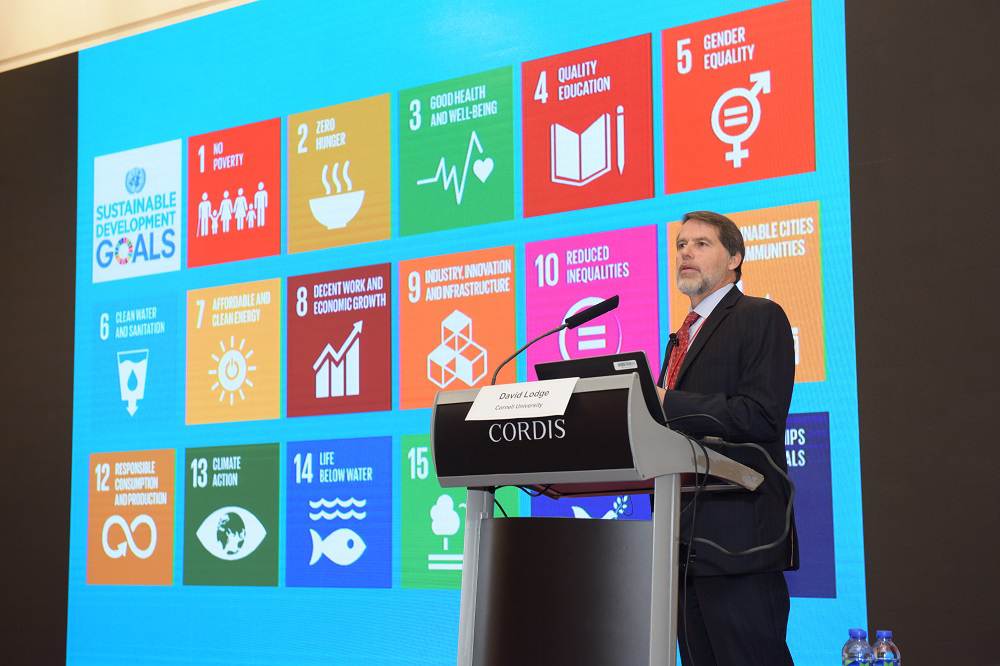Asia conference highlights Cornell's sustainability efforts
By Linda Copman

In an increasingly interconnected world, sustainability challenges require collaborative, holistic approaches, Cornell University experts said at a conference in Hong Kong April 6-7. The university, they said, is prepared to play a central role in that process.
“Sustainability in Asia: Partnerships for Research and Implementation” brought together 80 academic researchers and practitioners from the public and private sectors in Asia and the United States. International scholars, scientists, consultants and policy influencers shared sustainable practices and solutions.
Presentations reflected the breadth of Cornell’s commitment to sustainable development across colleges and disciplines. Panelists discussed internal projects such as Earth Source Heat, an enhanced-geothermal system Cornell is researching as part of its plan to become carbon neutral by 2035, as well as the university’s collaborations with partners across Asia to increase food production, decrease disease, produce sustainable energy and conserve the environment.
David M. Lodge, the Francis J. DiSalvo Director of the David R. Atkinson Center for a Sustainable Future, said progress is possible if universities collaborate with the private and public sectors to find solutions. When universities partner with governments, corporations and community groups they can improve sustainability practices, innovate new products and develop more effective policies, he said.
“Universities are the only institutions with the intellectual breadth and depth to analyze such wicked problems and point the way toward solutions,” he said.
Lodge suggested universities must actively seek out interdisciplinary collaborations with nonacademic partners. “This is essential, as university-driven research alone is not sufficient to cause more sustainable practices and policies,” he said.
Ronnie Coffman, the Andrew H. and James S. Tisch Distinguished University Professor and director of International Programs in the College of Agriculture and Life Sciences, focused on the challenges of food security in light of global climate change.
“To be successful in addressing food deficits and climate change, we need to forge global collaborations and build human capacity,” Coffman said.
He suggested universities can do a better job communicating about science to the general public so that people understand the importance of scientific research in solving global challenges. He spoke about the success of recent Cornell-led efforts to combat the stem rust fungus that threatened the global wheat harvest. To combat this threat, researchers needed to communicate effectively with policymakers and community members so that scientific knowledge could inform decision-making.
Hirokazu Miyazaki, director of the Mario Einaudi Center for International Studies and the John S. Knight Professor of International Studies, spoke about the need to develop new forms of communication and collaboration.
Miyazaki argued that current challenges require democratic solutions. He said nuclear disasters provide a good example of how national responses fall short of addressing global impacts. By studying Three Mile Island, Chernobyl and Fukushima, it is clear that ad hoc responses to these disasters by national governments did not address spillover effects that crossed beyond their borders, he said. Through the Einaudi Center and the Meridian 180 program, Miyazaki has convened an international Nuclear Energy Working Group to explore fairer systems for compensating victims of nuclear accidents.
In the closing panel, Provost Michael Kotlikoff drew attention to two reasons why Cornell is well-positioned to lead the global conversation on sustainability. From its founding, Cornell has combined what Kotlikoff described as the “profound” with the “practical.” He said Cornell’s quest for pure discovery has always been matched by a commitment to practical implementation.
Cornell’s second distinguishing feature is the breadth of the institution. “The range of faculty interests and expertise, spanning the humanities, social sciences, physical and biological sciences, and more, allows Cornell to have a profound impact on a broad spectrum of issues,” Kotlikoff said.
The conference, organized by the Einaudi Center and the Atkinson Center, with funding from the Global Cornell initiative, honored the late Cornell President Elizabeth Garrett. During her tenure, Garrett envisioned an expanded global role for Cornell, building on the strengths of the university’s long-standing partnerships in China, where a new Cornell office recently opened.
Linda Copman is a writer for Global Cornell.
Media Contact
Get Cornell news delivered right to your inbox.
Subscribe